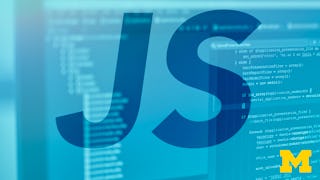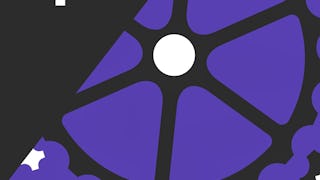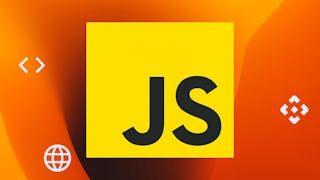- Browse
- Jquery
jQuery Courses
jQuery courses can help you learn how to manipulate HTML documents, handle events, create animations, and manage AJAX requests. You can build skills in DOM traversal, event handling, and optimizing web performance. Many courses introduce tools like jQuery UI for building user interfaces and plugins that enhance functionality, allowing you to create interactive web applications. Additionally, you'll explore techniques for integrating jQuery with other libraries and frameworks, making your web projects more dynamic and responsive.
Popular jQuery Courses and Certifications
 Status: Free TrialFree Trial
Status: Free TrialFree TrialSkills you'll gain: jQuery, Ajax, Javascript and jQuery, JSON, Animations, Event-Driven Programming, Debugging, UI Components, Application Programming Interface (API), Web Applications, Web Development Tools, Responsive Web Design, Javascript, HTML and CSS, Interaction Design, Game Design, Cascading Style Sheets (CSS), Data Validation, Hypertext Markup Language (HTML), User Interface (UI) Design
Intermediate · Specialization · 3 - 6 Months
 Status: Free TrialFree TrialU
Status: Free TrialFree TrialUUniversity of Michigan
Skills you'll gain: JSON, jQuery, Javascript and jQuery, Ajax, Debugging, Web Development Tools, Event-Driven Programming, Javascript, PHP (Scripting Language), Object Oriented Programming (OOP), Data Import/Export, Web Applications
4.6·Rating, 4.6 out of 5 stars832 reviewsIntermediate · Course · 1 - 4 Weeks
 Status: Free TrialFree Trial
Status: Free TrialFree TrialSkills you'll gain: jQuery, Javascript and jQuery, Event-Driven Programming, Web Development Tools, UI Components, HTML and CSS, Javascript, Web Applications, Data Validation, Animations
Beginner · Course · 1 - 3 Months
 Status: NewNewStatus: Free TrialFree Trial
Status: NewNewStatus: Free TrialFree TrialSkills you'll gain: Node.JS, Responsive Web Design, JSON, jQuery, Restful API, HTML and CSS, Bootstrap (Front-End Framework), API Design, GitHub, Git (Version Control System), Postman API Platform, Web Design, Hypertext Markup Language (HTML), Web Development, MongoDB, Back-End Web Development, Server Side, Full-Stack Web Development, Cascading Style Sheets (CSS), Web Development Tools
Beginner · Specialization · 3 - 6 Months
 Status: Free TrialFree TrialU
Status: Free TrialFree TrialUUniversity of California, Davis
Skills you'll gain: jQuery, Javascript and jQuery, Ajax, Javascript, Data Manipulation, Data Validation, UI Components, HTML and CSS, Scripting, JSON, Scripting Languages, Event-Driven Programming, Web Development Tools, JavaScript Frameworks, Web Applications, Web Design and Development, Game Design, Application Programming Interface (API), Object Oriented Programming (OOP), Animations
4.7·Rating, 4.7 out of 5 stars1.1K reviewsBeginner · Specialization · 3 - 6 Months
 Status: Free TrialFree TrialU
Status: Free TrialFree TrialUUniversity of Michigan
Skills you'll gain: Application Deployment, Django (Web Framework), Object-Relational Mapping, HTML and CSS, Model View Controller, jQuery, Ajax, JSON, Database Design, SQL, Application Frameworks, Databases, Web Applications, Application Development, Object Oriented Programming (OOP), Web Development, Data Modeling, Javascript, Application Security, Cascading Style Sheets (CSS)
4.7·Rating, 4.7 out of 5 stars2.5K reviewsIntermediate · Specialization · 3 - 6 Months
What brings you to Coursera today?
 Status: Free TrialFree Trial
Status: Free TrialFree TrialSkills you'll gain: Ajax, jQuery, JSON, Javascript and jQuery, Debugging, Application Programming Interface (API), Web Development Tools, Web Applications, Javascript, Game Design, UI Components, Cascading Style Sheets (CSS), Hypertext Markup Language (HTML), User Interface (UI) Design
Intermediate · Course · 1 - 3 Months
 Status: Free TrialFree Trial
Status: Free TrialFree TrialSkills you'll gain: jQuery, Javascript and jQuery, Animations, Debugging, UI Components, Event-Driven Programming, Responsive Web Design, Web Applications, HTML and CSS, Interaction Design
Intermediate · Course · 1 - 4 Weeks
 Status: NewNewStatus: Free TrialFree Trial
Status: NewNewStatus: Free TrialFree TrialSkills you'll gain: JSON, jQuery, Web Development Tools, Browser Compatibility, UI Components
Intermediate · Course · 1 - 4 Weeks
 Status: Free TrialFree TrialU
Status: Free TrialFree TrialUUniversity of Michigan
Skills you'll gain: jQuery, Ajax, JSON, Django (Web Framework), Javascript, Object Oriented Programming (OOP), Web Development Tools, Debugging
4.8·Rating, 4.8 out of 5 stars291 reviewsIntermediate · Course · 1 - 3 Months
 Status: Free TrialFree TrialU
Status: Free TrialFree TrialUUniversity of Virginia
Skills you'll gain: User Story, Javascript, Model View Controller, Debugging, HTML and CSS, Prototyping, jQuery, Web Applications, Hypertext Markup Language (HTML), User Interface (UI), Interactive Design, Web Design and Development, Web Development Tools, Web Design, Application Programming Interface (API), Application Development, Cascading Style Sheets (CSS), Software Development, Software Development Tools, User Experience
4.2·Rating, 4.2 out of 5 stars74 reviewsBeginner · Specialization · 1 - 3 Months
 Status: Free TrialFree TrialU
Status: Free TrialFree TrialUUniversity of Michigan
Skills you'll gain: Database Design, SQL, MySQL, PHP (Scripting Language), Relational Databases, JSON, jQuery, Hypertext Markup Language (HTML), Javascript and jQuery, Ajax, Databases, Data Modeling, Database Application, Database Development, Debugging, Web Applications, Object Oriented Programming (OOP), Application Development, Web Development, Javascript
4.7·Rating, 4.7 out of 5 stars9.3K reviewsIntermediate · Specialization · 3 - 6 Months
Searches related to jquery
In summary, here are 10 of our most popular jquery courses
- The Complete jQuery Course - Beginner to Professional: Packt
- JavaScript, jQuery, and JSON: University of Michigan
- Introduction to jQuery and Basic Concepts: Packt
- Full Stack Web Development Mastery - Novice to Expert: Packt
- JavaScript for Beginners: University of California, Davis
- Django for Everybody: University of Michigan
- Advanced Projects and API Integration with jQuery: Packt
- Advanced jQuery Techniques and Interactivity: Packt
- Data & Modern Frontend Development: Packt
- Using JavaScript and JSON in Django: University of Michigan
Frequently Asked Questions about Jquery
jQuery is a fast, small, and feature-rich JavaScript library. It allows users to easily navigate HTML documents, handle events, create animations, and add interactivity to their websites. jQuery simplifies the process of writing JavaScript code and provides a wide range of functions and methods to enhance web development. Whether it's selecting and manipulating elements, handling AJAX requests, or creating dynamic web pages, jQuery is a powerful tool that makes web development more efficient and user-friendly.
To fully utilize jQuery, you should have a solid understanding of HTML, CSS, and JavaScript. Additionally, it would be beneficial to have experience with manipulating the Document Object Model (DOM), event handling, and AJAX (Asynchronous JavaScript and XML). Understanding basic programming concepts such as variables, functions, and loops would also be helpful.
With jQuery skills, you can pursue various job roles in the web development field. Some of the common job titles you can aim for include:
Front-End Developer: Many companies look for front-end developers with expertise in jQuery to enhance user experience and create interactive interfaces for websites and web applications.
Web Developer: As a web developer proficient in jQuery, you can contribute to the development and maintenance of websites, ensuring functionality and responsiveness across different platforms and browsers.
JavaScript Developer: jQuery is built on JavaScript, so having jQuery skills can be beneficial if you are interested in specialized JavaScript roles. You can create dynamic web pages, build web applications, and work on JavaScript frameworks in various organizations.
UI/UX Developer: Understanding jQuery can be valuable for UI/UX developers, as it enables you to create visually appealing and user-friendly interfaces using jQuery UI, a popular jQuery extension for adding animations, widgets, and other UI elements.
Full-Stack Developer: jQuery is often used in conjunction with other web development technologies and frameworks. By being proficient in jQuery, you can become a full-stack developer, working on both front-end and back-end aspects of web development.
Mobile App Developer: jQuery Mobile, a mobile-optimized version of jQuery, allows you to create mobile applications using HTML, CSS, and JavaScript. You can specialize in mobile app development, leveraging your jQuery skills to build cross-platform mobile apps.
- Freelancer: With jQuery skills, you have the flexibility to work as a freelancer and offer your expertise to clients in need of jQuery-based web development or customization services.
Remember, these are just a few examples of the job prospects for individuals with jQuery skills. The tech industry constantly evolves, providing new opportunities, so continuous learning and staying updated with emerging technologies is essential for long-term career growth.
People who are interested in web development and have a basic understanding of HTML, CSS, and JavaScript would be best suited for studying jQuery. jQuery is a JavaScript library that simplifies the process of manipulating HTML documents, handling events, and creating animations on websites. Therefore, individuals who are already familiar with these foundational web technologies would find it easier to grasp the concepts and effectively utilize jQuery in their projects.
Here are some topics related to jQuery that you can study:
jQuery basics: Learn the fundamentals of jQuery, including selectors, events, and effects.
DOM manipulation with jQuery: Explore how to manipulate the Document Object Model (DOM) using jQuery.
jQuery animations and effects: Dive into the various animation and visual effects capabilities provided by jQuery.
jQuery AJAX: Understand how to make asynchronous requests to the server and handle responses using jQuery.
jQuery UI: Discover the jQuery UI library, which provides user interface components, themes, and interactions.
jQuery plugins: Learn how to extend jQuery's functionality by utilizing third-party plugins.
jQuery Mobile: Explore the mobile-focused version of jQuery, designed for creating mobile web applications.
Advanced jQuery techniques: Go beyond the basics and delve into more advanced techniques and patterns with jQuery.
jQuery best practices: Familiarize yourself with recommended coding practices to write efficient and maintainable jQuery code.
- jQuery and other frameworks: Explore how jQuery can be used in conjunction with other JavaScript frameworks, such as AngularJS or React.
These topics will help you gain a comprehensive understanding of jQuery and enhance your web development skills.
Online jQuery courses offer a convenient and flexible way to enhance your knowledge or learn new jQuery is a fast, small, and feature-rich JavaScript library. It allows users to easily navigate HTML documents, handle events, create animations, and add interactivity to their websites. jQuery simplifies the process of writing JavaScript code and provides a wide range of functions and methods to enhance web development. Whether it's selecting and manipulating elements, handling AJAX requests, or creating dynamic web pages, jQuery is a powerful tool that makes web development more efficient and user-friendly. skills. Choose from a wide range of jQuery courses offered by top universities and industry leaders tailored to various skill levels.
When looking to enhance your workforce's skills in jQuery, it's crucial to select a course that aligns with their current abilities and learning objectives. Our Skills Dashboard is an invaluable tool for identifying skill gaps and choosing the most appropriate course for effective upskilling. For a comprehensive understanding of how our courses can benefit your employees, explore the enterprise solutions we offer. Discover more about our tailored programs at Coursera for Business here.










